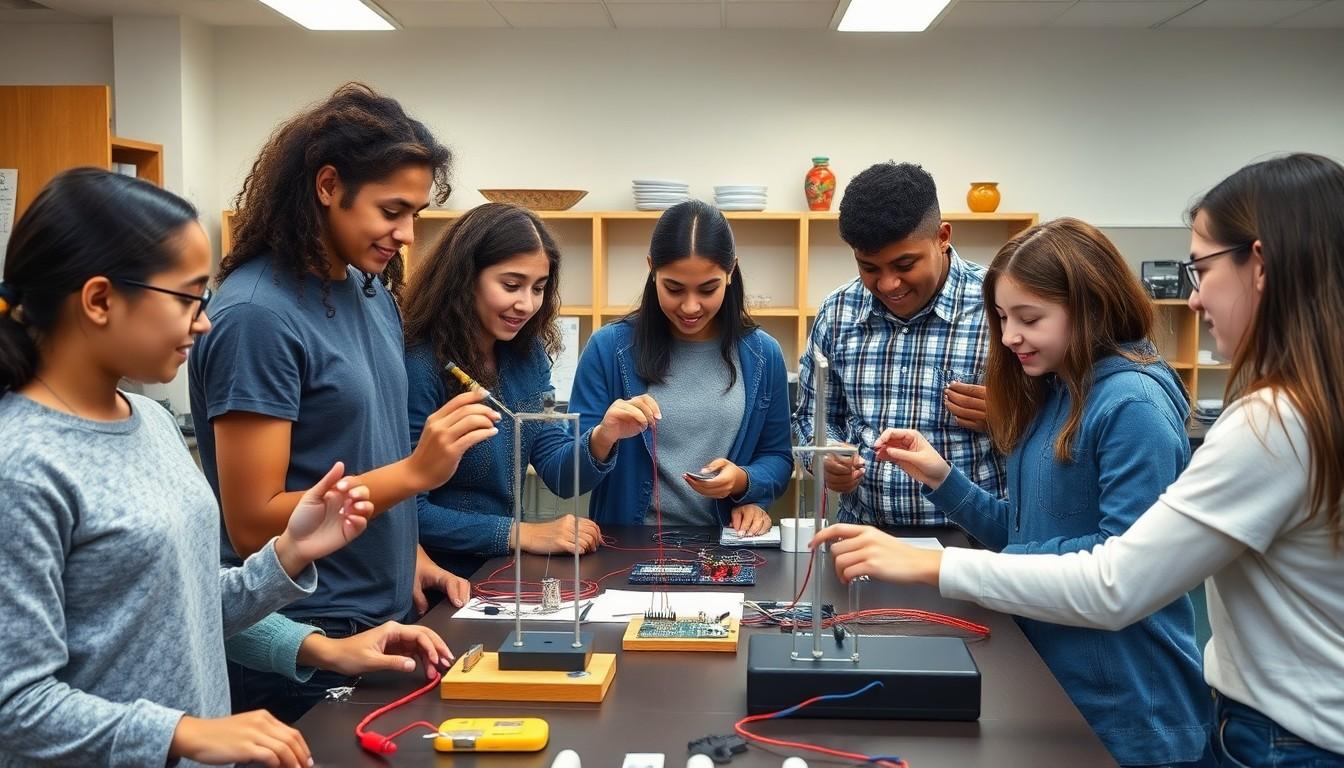Table of Contents
ToggleIn a world where AI can beat humans at chess and compose symphonies, one burning question remains: can ChatGPT tackle the complexities of physics? Picture this—an AI that can effortlessly explain quantum mechanics while you sip your coffee. Sounds like a sci-fi fantasy, right? But as technology leaps forward, it’s time to explore whether this digital brain can help students ace their physics exams or if it’s just another overhyped gadget.
Overview of ChatGPT and Its Capabilities
ChatGPT represents a sophisticated AI language model developed by OpenAI, capable of generating human-like text. It utilizes vast datasets, encompassing multiple fields, including physics. This model aids users in clarifying complex concepts and answering specific questions.
Physics can present challenges, often requiring deep understanding and analytical thinking. Students frequently seek assistance with topics like quantum mechanics or classical mechanics. ChatGPT can provide explanations, simplify terminology, and break down problems into manageable steps.
The technology analyzes queries and tailors responses based on context. For instance, if a user asks about the principles of relativity, ChatGPT generates answers similar to a knowledgeable peer or tutor. Users often report that the interactions feel natural and informative.
Accuracy varies based on the complexity of questions. Some inquiries may elicit precise responses, while others involving highly specialized knowledge may yield less reliable information. This potential variability highlights the importance of cross-referencing ChatGPT’s answers with authoritative resources.
Additionally, ChatGPT engages in dialogue, encouraging deeper exploration of physics concepts. In many instances, it can guide users through problem-solving processes or offer alternative perspectives on challenging topics. Its interactive capabilities often enhance the learning experience.
Limitations exist regarding the depth of knowledge in cutting-edge areas of physics. The model’s understanding is bound by its training data, which is up to date until October 2021. Therefore, users pursuing the latest advancements or theories in physics might need to consult recent studies or expert opinions for comprehensive insights.
Understanding Physics as a Discipline

Physics represents a foundational science that explores the principles governing matter and energy. This discipline encompasses various key concepts and applications, revealing the universe’s inner workings.
Key Concepts in Physics
Laws of motion dictate how objects interact. Classical mechanics outlines the behavior of macroscopic objects, while quantum mechanics focuses on subatomic realms. Thermodynamics addresses heat and energy transfer, illustrating their role in physical processes. Electromagnetism describes the forces governing electric charges and magnetic fields. Relativity examines the impact of gravity on space and time, reshaping perceptions of the universe. Each of these concepts forms the basis for deeper explorations in the field.
Common Applications of Physics
Physics serves as a basis for numerous technological advancements. Engineers apply principles of mechanics and materials science to design structures and machines. Medical imaging technologies, such as MRI and X-rays, rely on physics to produce accurate images of the human body. Telecommunications leverage electromagnetic waves for data transmission. Renewable energy sources, including wind and solar power, depend on physics to optimize energy conversion. These applications demonstrate how physics enhances daily life and drives innovation.
Evaluating ChatGPT’s Performance in Physics
ChatGPT demonstrates notable strengths in the domain of physics through its ability to provide clear explanations and tailored responses.
Strengths of ChatGPT in Physics
Clarity defines ChatGPT’s approach when explaining foundational physics topics. Users often find it adept at breaking down complex concepts, making them more accessible. It excels in areas such as classical mechanics and thermodynamics, offering concise summaries and useful examples. Engaging with the model invites iterative dialogue, allowing users to explore topics progressively. Additionally, the AI generates responses that resemble conversations with knowledgeable peers, enhancing the learning experience.
Limitations of ChatGPT in Physics
Despite its capabilities, ChatGPT has limitations that impact its effectiveness. The accuracy of its responses may diminish with advanced inquiries, especially in cutting-edge physics realms. Commencing from data only current until October 2021, it lacks insights into recent developments. Users may encounter outdated information or incomplete explanations related to newer topics like quantum computing or string theory. Cross-referencing answers with authoritative sources remains essential for precise understanding. Engaging with experts or recent literature can help address the gaps in knowledge that the model may present.
User Experiences and Testimonials
User experiences highlight a mix of success and challenges with ChatGPT in mastering physics concepts.
Success Stories
Many students report favorable interactions with ChatGPT while studying physics. They find it particularly helpful in topics like classical mechanics and thermodynamics. According to testimonials, the model simplifies complex ideas and encourages engagement through iterative questioning. Various users praise its ability to explain abstract concepts, enabling them to grasp difficult material with ease. Students also mention using ChatGPT for exam preparation, benefiting from its clear explanations of fundamental principles.
Critiques and Challenges
Feedback from users also emphasizes some limitations. Accuracy can fluctuate with intricate or niche queries. Varied experiences arise when dealing with more advanced topics, leading some users to express frustration. A few note instances of outdated information, particularly regarding cutting-edge developments in physics. These critiques highlight the importance of supplemental resources to verify answers. Many users recommend approaching ChatGPT’s responses with caution, particularly for high-stakes situations like exams or research projects.
ChatGPT shows promise as a tool for understanding physics concepts. Its ability to provide clear explanations and engage users in dialogue makes it a valuable resource for students tackling challenging subjects. However its limitations in accuracy and depth for advanced topics remind users to approach its insights with caution.
While many find it helpful for foundational knowledge in areas like classical mechanics and thermodynamics students should supplement their learning with authoritative resources. This balanced approach ensures a comprehensive understanding of physics. With the right guidance ChatGPT can enhance the learning experience but it’s essential to verify its responses for the most accurate and up-to-date information.






